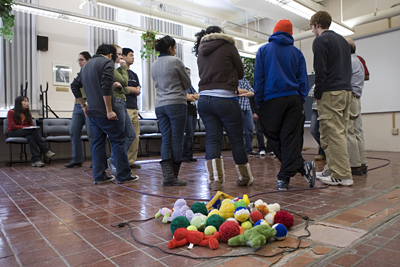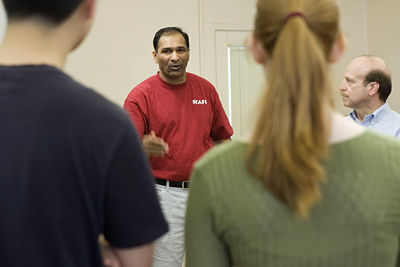New courses teach food science and business majors leadership and team-building skills
By Jill McCoy Susan S. Lang


Walking into Professor Bob Gravani's Leadership and Career Skills in Food Science (FS 102) class Feb. 29, students found ropes and furry objects on the ground. It was clear that this class again would be no ordinary lecture.
This newly revised one-credit required course is intended to get students thinking early on about enhancing their leadership and team skills, the importance of diversity and ethics, and their own career development. Like its counterpart, Applied Economics and Management (AEM) 102: Personal Evaluation and Development, a new required course for all first-year undergraduate business majors, it is a hands-on approach to developing teamwork and leadership, vital skills in today's work world. Both courses work closely with the Team and Leadership Center of the Cornell Outdoor Education program to help teach the skills.
For the Feb. 29 food science class, for example, instructor Paul Louis of the Team and Leadership Center challenged the class to transfer about 40 small objects from one end of a roped-off rectangle to the other in 90 seconds or less, but the objects had to first touch each person lined up on the perimeter of the rectangle. The objects could not be passed to the very next person, nor could anyone leave his or her side of the rectangle.
Carolyn Junior '11 stepped in to read the directions and suggest a few strategies. Soon, the room was a whirlwind of brainstorming.
With 10 minutes to spare, the team tried a plan, but two objects got stuck in the middle of the rectangle amid the furor of the trial. The team tried again and succeeded.
But in the discussion afterward, Louis showered little praise. He said that at one point he heard three students trying to voice potential plans, but they were drowned out. Why had communication been messy during the brainstorming process? He said that as individuals we all tend to think our own agenda is the right one. Instead, our own ideas should be only a starting point, he said, to use to expand to a richer, more global perspective. The key, he said, is to listen, pointing out that there are three types of listening -- passive, active and "third-eye" listening, where the listener is detached from the self. All three types are important, but the third may be the most valuable.
Upon reflection, Junior said that "as a leader you need to balance what you have to say with what everyone else has to say."
Although the food science and applied economics courses are similar, they were developed independently, said Andrew Novakovic, the E.V. Baker Professor of Agricultural Economics who teaches AEM 102.
"This is a first for both our departments," said Novakovic. "It's a very different course for both our departments, but I think it will be the kind of course that students appreciate more and more after it is over." Although such courses are fairly common among MBA programs, he added, none of the top 10 undergraduate business programs "offer anything like it, at least that we could see when we benchmarked it."
The objective of AEM 102, he said, "is to get students to think about who they are and their personal assets or strengths and weaknesses. I want them to better understand that their individual characteristics and assets will be different, not worse or better, than for other folks. One aspect of this is learning how to function better in team settings and/or as a leader. In addition, we are weaving in topics of ethics, cooperation, trust and diversity as issues that are part of working with other people."
Jill McCoy '09 is a writer intern at the Cornell Chronicle.
Media Contact
Get Cornell news delivered right to your inbox.
Subscribe